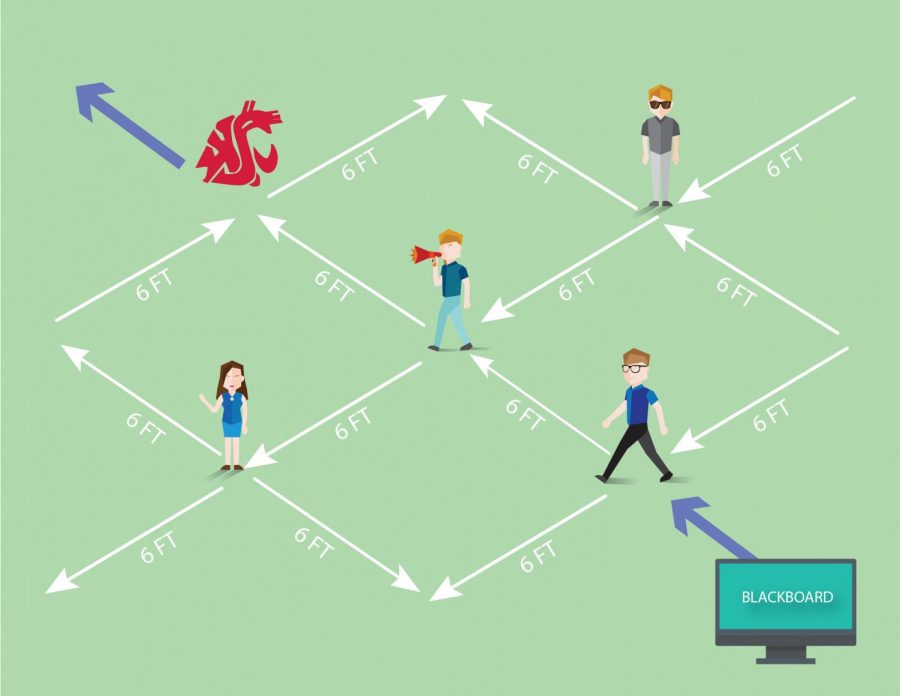OPINION: WSU needs to communicate better about COVID-19
Twitter should not be the main way WSU communicates with the concerned public
Notifications about COVID-19 updates at WSU should not only be sent to students. This information should be easier to access.
April 6, 2020
COVID-19 has caused major changes in nearly everyone’s lives at this point. Over the last four weeks, different institutions and corporations have released statements and plans regarding their response to the global pandemic. In the case of WSU, the conversation took a quick shift and left many students wishing they got a better warning.
Parents and students experienced a jarring change in plans partially through spring break when the message from WSU officials shifted from ‘we can’t wait to see you back after break’ to ‘please refrain from coming back unless it is necessary.’ This massive shift in the plan was not something the university took lightly, as it was weighing the options of disappointing the student community against putting the entirety of the Pullman population at risk. With students already gone it was easier to ask them to please stay put, but this seemingly last second change was basically heartbreaking for many students.
“As a senior, I really wish that before spring break we could have had the conversation that you might need to hug your friends a little harder right now. At least then when no one could come back after I would have at least gotten to say goodbye to everyone the way we deserved after four years together,” said Delaney Watkins, senior marketing major.
I’m just a sophomore and I still find myself frequently wishing I got the opportunity to savor my last few interactions with my friends before summer kicked in. The lack of closure only adds to the feeling of living in limbo being experienced nearly universally during the age of self-quarantine. I find myself almost in a state of disbelief trying to imagine not seeing the people I usually see every single day, for the next six months.
“I feel like WSU just threw up a website and said here’s your questions and here are answers. I feel like WSU is not really updating us like on a weekly basis to the point that the University of Oregon [where her other child attends] has been,” said Diane Dutsche, a parent of a WSU student.
Communication from the university has been what some would call sporadic, and a little bit all over the place. But, to give them credit, this has been seen almost across the board with many different institutions and businesses faltering at the predicament of COVID-19. The informative website provided by the university was substantial initially, but parents themselves have growing concerns and more information sent in their direction seems necessary. Keeping them as informed as the students would help alleviate stress for all parties.
The town halls that have been hosted since spring break are attempting to ease these worries, but the announcements for them seem to be missing the people who want it most. Dutsche even said she wished WSU would begin hosting virtual town halls in the same way the University of Oregon has done and was shocked to hear they had been.
The daily updates from the schools COVID-19 website are sent to WSU email addresses only, meaning that concerned parents don’t receive them and probably do not hear about them either. Overall, it’s not that the university has done a poor job communicating with everyone about what is going on. Yes, the school should prioritize telling parents about these updates in a better way, but they should do this because they recognize the different types of stress being put onto students.
Personally, I have seen the bulk of these announcements through WSU President Kirk Schulz’s Twitter page, but it is necessary for our administration to recognize that not all parents — or even students for that matter — use Twitter. With Schulz seeking to lead the conversation on Twitter, it is easy to see where parents and potentially students are becoming confused. The university’s messages are almost being lost in the mail as they have not clearly communicated where we should be looking for these sorts of updates.
Most students spend more time checking school emails for information regarding the major changes in their daily academic operations, with little regard for the updates.
Assuming students are the only people who want the information from the university is counterproductive and ends up just adding another task to our already full plates. Parents want to know what is going on — some even more than their students. By leaving them out of the loop you’re just forcing students to have to fill them in when you could have just sent them the emails too. By streamlining the communication between administration and parents, strain on students would be minimized so they can spend more time focusing on teaching themselves.






















Leo Devine • Apr 7, 2020 at 8:26 pm
Personally, I think this opinion is wrong. I have a pl friend that attends WSU and he has shared everything he knows with us. He wasn’t even able to attend the funeral services of his grandmother because of this pandemic. In regards to Pullman, it simply is in the best interest to the entire community that students stay put at their home if they can. Obviously Pullman seems to be an undersized community, and with the action of bringing a large amount of the population back into town from outside places following Spring Break, there would be a higher risk of spreading throughout the community than what is actually current.
Ben Rearick • Apr 6, 2020 at 2:54 pm
Thank you for writing this. A faculty member has logged a constituent concern (unaddressed as of 4/6) about the president’s use of Twitter seen here: https://facsen.wsu.edu/2020/03/09/confusing-messaging-surrounding-covid-19/